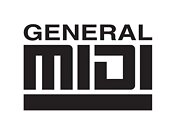- Joined
- Oct 9, 2007
- Messages
- 47,511 (7.49/day)
- Location
- Hyderabad, India
| System Name | RBMK-1000 |
|---|---|
| Processor | AMD Ryzen 7 5700G |
| Motherboard | ASUS ROG Strix B450-E Gaming |
| Cooling | DeepCool Gammax L240 V2 |
| Memory | 2x 8GB G.Skill Sniper X |
| Video Card(s) | Palit GeForce RTX 2080 SUPER GameRock |
| Storage | Western Digital Black NVMe 512GB |
| Display(s) | BenQ 1440p 60 Hz 27-inch |
| Case | Corsair Carbide 100R |
| Audio Device(s) | ASUS SupremeFX S1220A |
| Power Supply | Cooler Master MWE Gold 650W |
| Mouse | ASUS ROG Strix Impact |
| Keyboard | Gamdias Hermes E2 |
| Software | Windows 11 Pro |
USB Implementers Forum (USB-IF), the support organization for the advancement and adoption of USB technology, today announced an updated USB Device Class Definition for MIDI Devices, Version 2.0 in support of MIDI 2.0 devices. The standard represents an industry-wide effort by the USB-IF, MIDI Manufacturers Association (MMA), and Association of Musical Electronics Industry (AMEI) to provide MIDI users with an expanded MIDI environment connected by USB.
"USB-IF is proud to support the MMA and AMEI by publishing an updated USB Device Class Specification for next-generation MIDI devices," said Jeff Ravencraft, USB-IF President and COO. "USB has been an integral part of the MIDI environment over the past 20 years, and we look forward to seeing innovative new devices that are enabled by this updated specification."

Mike Kent, Project Chair of the USB MIDI class specification and Chairman of the MMA's MIDI 2.0 Working Group, said, "This updated specification delivers many improvements that musicians and artists want from MIDI 2.0, including bidirectional communication, higher-speed throughput, more MIDI channels, accurate timing with dense MIDI streams, and backwards compatibility with MIDI 1.0 devices. The USB-IF's work is a major, and significant, step forward for MIDI 2.0."
The original USB Device Class Specification supporting MIDI 1.0 devices was published in 1999. Since then, USB MIDI has grown significantly and is now the most widely used transport for MIDI. The updated specification uses the new Universal MIDI Packet format over USB, and is designed to cover the widest range possible of MIDI applications and products. This USB specification is a key enabler for MIDI 2.0, supporting the inspiring features of MIDI 2.0 devices while integrating backward support for MIDI 1.0 devices.
Companies contributing to the updated specification include Apple Corporation, Knowles Corporation, Native Instruments, Roland Corporation, and Yamaha Corporation.
View at TechPowerUp Main Site
"USB-IF is proud to support the MMA and AMEI by publishing an updated USB Device Class Specification for next-generation MIDI devices," said Jeff Ravencraft, USB-IF President and COO. "USB has been an integral part of the MIDI environment over the past 20 years, and we look forward to seeing innovative new devices that are enabled by this updated specification."

Mike Kent, Project Chair of the USB MIDI class specification and Chairman of the MMA's MIDI 2.0 Working Group, said, "This updated specification delivers many improvements that musicians and artists want from MIDI 2.0, including bidirectional communication, higher-speed throughput, more MIDI channels, accurate timing with dense MIDI streams, and backwards compatibility with MIDI 1.0 devices. The USB-IF's work is a major, and significant, step forward for MIDI 2.0."
The original USB Device Class Specification supporting MIDI 1.0 devices was published in 1999. Since then, USB MIDI has grown significantly and is now the most widely used transport for MIDI. The updated specification uses the new Universal MIDI Packet format over USB, and is designed to cover the widest range possible of MIDI applications and products. This USB specification is a key enabler for MIDI 2.0, supporting the inspiring features of MIDI 2.0 devices while integrating backward support for MIDI 1.0 devices.
Companies contributing to the updated specification include Apple Corporation, Knowles Corporation, Native Instruments, Roland Corporation, and Yamaha Corporation.
View at TechPowerUp Main Site

